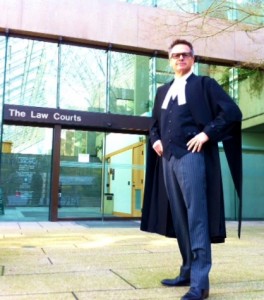
MacLean Law has been in the forefront of protecting children during separation for over 30 years. BC parental alienation and or BC parental estrangement is a serious issue in high conflict cases. We have held seminars and created videos to explain the hurtful scenario that occurs in BC parental alienation cases. We can be reached toll free across BC and Canada at 1-877-602-9900.
In this post we review cases on Canadian and BC parental alienation to demonstrate the approaches that the Canadian courts take in dealing with cases of parental alienation or estrangement. Read our blog post on BC Parental Alienation or Estrangement to find out more about parental alienation and estrangement.
Whether allegations of BC parental alienation are being made against you or you feel that you are being subjected to BC parental alienation, it is critical that obtain legal counsel who have the experience and knowledge of dealing with cases involving BC parental alienation, as the case law demonstrates, the court may order complete change in parenting arrangements such as sole custody/sole guardianship to the absent/alienated parent.
Canadian Cases where claims for parental alienation were successful
Canadian courts’ approach to remedy consequences of BC parental alienation depends on the circumstances of each case, which includes the expert evidence, the age of the children, the blameworthy conduct of parents in alienating the children. The remedies ordered in BC parental alienation cases ranges from parties and children attending counseling to a complete reversal of the parenting arrangement. In extreme cases, the courts have ordered sole custody/sole guardianship to the alienated/absent parent, with no parenting time for the alienating parent. Please be advised that the list of cases provided here is non-exclusive.
Cases where the court ordered sole custody/sole guardianship to alienated/absent parent:
In the case of P. M. v. M. N., [2008] B.C.J. No. 2308, 2008 BCSC 1501 (B.C.S.C), one of the issues in dispute was the parenting arrangement of the parties’ 9 years old daughter. After separation, the child did not want to spend time with her father. The mother initially dictated father’s parenting time with the child and required that the parenting time be supervised and at her own place and only in 2 specific rooms. The father applied to court and obtained an order that parenting time be unsupervised. Despite the order, the mother complained to the Ministry and continued to impose her requirement that the parenting time be supervised. The mother was found to be in contempt of the court. Taking into account expert evidence regarding existence of parental alienation through mother’s conduct, the court concluded that the mother had engaged in parental alienation and the long-term effect on the child of staying in the home of the mother and grandmother would likely be detrimental. On the other hand, the father had taken parenting courses and was completely committed to the child. As a result, the father was awarded sole custody and sole guardianship of the child.
In the case of S.O. v. S.C.O., [1999] N.B.J. No. 326, the mother brought an application against the father for sole custody of their two children, aged 9 and 7. After the separation, the father moved with the children to Nova Scotia and denied access to the mother. The mother obtained an interim custody order. The father alienated the children from the mother, and tried to make her situation as difficult as possible. The children were in a constant state of confusion because of the father’s negative behaviour. A psychological assessment revealed that the children suffered from parental alienation syndrome, caused by the father. The father was impulsive, immature and could not face reality or maintain adequate judgment. He had a borderline personality disorder and was opportunistic and manipulative. He was not willing to receive help for his problems. The mother had been psychologically abused during the marriage. However, she was open, empathetic and warm. She did not exhibit psychological problems and was not addicted to alcohol or drugs.
The court awarded sole custody of the children to the mother and the father was to have no access to the children until he attended counseling. The court stated:
“61 The mother emerged as the parent most closely associated with the needs of the children. She has the “best interests” of her children in mind and is concerned with their overall nurturing and development. That includes a relationship with their father, at a future date, when he has received counselling.
62 If the father were given custody, he would likely manipulate the situation to prevent the mother from having any access. He has shown, by his behavior throughout these proceedings, that he is a controlling individual who will not accept that his behavior is damaging the children, perhaps irretrievably.
63 Under the provisions of Section 129(2) of the Family Services Act, the Court must determine the issue on the basis of “best interests.”
….
64 The mother is granted custody of the children and, access is suspended as previously ordered on March 15, 1999. There will be no access until the father attends counselling and is able to convince a court that he can appropriately relate to his children without involving them in his dispute with his wife and otherwise alienating their affections for their mother.”
In J.M.M. v. K.A.M. 2005 NLUFC 2, LeBlanc J, considered the appropriate result from a finding of parental alienation was to award the innocent parent sole custody as well as sole and absolute right and authority for all decision making. Despite a finding of parental alienation, the Court awarded the father, generous access to the 12 years old boy.
In J. W.C. v. J. K. R. W., [2014] B.C.J. No. 503, despite the fact that the parties had shared and equal parenting arrangement for 3 years in relation to their two children, aged 13 and 11, they resisted seeing their father. The section 211 report found that the mother had alienated the children from the father. The section 211 author, Dr. England, was also present at the chamber’s application to provide viva voce evidence. Based on the expert evidence and the affidavit evidence of the parties, the court found that the mother had engaged in parental alienation and that this constituted a change in the circumstances warranting varying the shared and equal parenting order. The father was granted sole custody, sole guardianship and primary residence of the children. The court further ordered the parties and the children attend Family Reflections Reunification Program (FRRP) as the traditional counseling had not resolved the conflict between the parties or modified their behaviours.
Cases where the court ordered substantial increase in parenting time to the absent/alienated parent
In the case of Elliott v. Elliott, [1996] A.J. No. 74, the father applied for sole custody of the parties’ child. The parties were married for three years and they a child together who was 4 years old. Since separation, the child had, by agreement between the parties, resided with the applicant father with weekend access to the respondent mother. The evidence indicated that the child was well cared for, nurtured and loved by each parent and that he was attached to both parents. However, the father attempted to alienate the child from the mother and also displayed suppressed hostility.
Relying on expert evidence and oral testimony of the parties, the court dismissed the father’s application and ordered joint custody of the child with the day-to-day residence of the child to be with the mother. The court found that the residual feelings which the applicant father had for the respondent made a smooth interaction with the child problematic. According to the court, the most appropriate method of insuring that the best interests of the child were met was to order joint custody. The father appealed the case, however, his appeal was dismissed.
In Lopez v. Dotzko, [2011] O.J. No. 5211, the parties had one child together, a 14 year old daughter. Since separation, the parties had an acrimonious relationship. When the parties separated, the mother had custody of the child. However, beginning in April 2002, the mother entered into consent orders giving temporary custody of the child to the father. The mother, who did not speak English well, was not in a strong financial position and was intimidated by the father and his parents, believed the terms of the consent orders would protect her continued access to the child. Since then, the child had lived with the father and his parents. The mother has exercised access to her but, since 2005, that access had been limited to two hours per week at a supervised access centre.
The child had indicated to a social worker that she wished to remain in the father’s custody and that her access with the mother be limited.
The Children’s Lawyer recommended that the father continue to have sole custody and primary residence of the child and that the mother exercise access on the weekends, three out of four weekends per month, that the mother attend for relationship counselling with the child and the father attend a parenting group.
The mother sought interim custody or unsupervised access. The father opposed the mother’s motion for interim custody or increased unsupervised access on the basis that there had been no material change in circumstances that justified variation of the previous court order.
The court, taking into account the clinical assessment of the child, found that the father had alienated the child from the mother. The court also found that there was a material change of circumstances that warranted changes in the parenting arrangement because
1. the father had failed to co-oporate with the reconnection counselling, in breach of a previous order; and
2. the father undermined the mother’s relationship with the child amounting to parental alienation.
The court, having found parental alienation, raised concerns about relying on the child’s view as it was not possible to determine whether the child wishes were actually her own wishes or that of the father. The court was also mindful of making drastic changes to parenting arrangement in light of conflicting affidavit evidence and the affect that such changes might have on the child. The court, however, ordered that mother’s access to the child be substantially increased as there was evidence that the child may have suffered psychological or emotional harm by the interference of her relationship with the mother. The mother was to have access to the child one evening per week and alternate weekends, in addition to holiday access.
Cases where the court ordered counseling or made no changes in the parenting arrangement
In Samuelson v. Smauelson, [2011] N.J. No. 362, one of the issues in dispute was the parenting arrangement in relation to the parties’ 14 year old son and 9 year old daughter. The court having found that there was parental alienation by the mother in relation to the son (but not the daughter), refused to reverse the parenting arrangement but rather ordered counseling. According to the court:
“50 My analysis and consideration of what is in Kyle and Hannah’s best interests must be determined by reference to their conditions, means, needs and other circumstances: Section 16.(8) of the Divorce Act. Because facts differ — so do orders.
51 In Gulliver v. Earle (supra) after determining that there was both parental alienation and PAS orchestrated by a father, I concluded that the best interest of the parties’ nine year old daughter dictated a reversal of custody based upon the young child’s conditions, means and circumstances.
52 In D. (A.J.) v. D. (E.E.) (supra), having concluded that the mother directly and indirectly alienated the parties’ five year old daughter from her father, because a reversal of custody would be too much of a traumatic disruption to the child, I ordered separation anxiety therapy.
53 Kyle’s condition, means and circumstances include: his belief that he is safe and secure in his mother’s home and his father didn’t care about his safety; his dad will put him in a boy’s home to live; his father has hurt him physically and emotionally and his father has ruined his life. It also cannot be ignored that Kyle has had a high level of stress for many years which has, and does require counselling.
54 It is also of considerable significance that Kyle has run away from his father’s house on three or four occasions. He has also indicated to child psychologist, Beverly McLean that he will keep running away from his father’s home if he cannot live with his mother on a full-time basis.
55 In addition, over a year has passed since Kyle attended limited counselling with Ms. Shortall. I have concluded that such counselling has not even reached the embryonic stage of a possible reintegration between Kyle and his father. This is regrettable.
56 I find that the foregoing facts illustrate that Kyle’s conditions, means and circumstances do not support a reversal of custody, at this time, because it clearly is not in this 14 year old boy’s best interests. This is principally because one can easily conclude that he will again run from his father’s home, a home which Kyle does not even wish to visit, and this could expose Kyle to substantive risk.”
In W.C. v. C.E., [2010] O.J. No. 2738, although the court found that the mother had severely alienated the parties’ 13 year old daughter from the father, the court refused to make a reversal of the parenting arrangement in favour of the father. Rather, the court ordered that father and the son attend therapeutic reunification counselling to effect reconciliation and reunification between the child and the father. According to the court the short and long term effect of immediate custody reversal were too great to be given serious considerations.
In Fielding v. Fielding, [2013] O.J. No. 3652, the mother brought an application to change the parenting arrangement on the bases that father had alienated the children from the mother. The parties had 3 children together, twins aged 15 and a daughter aged 17. The daughter and one of the twins resided with the father and the other resided with the mother. The father claimed that it was the mother’s behaviour that estranged the children from her. The father asked for a sole custody of the two children residing with him and joint custody of the child residing with mother.
The court found it was a novel case as both parents had engaged in alienation conduct and dismissed both their applications for change in the parenting arrangement. According to the court:
“166 My finding is that this is not a case of pure alienation. To the contrary, I accept Dr. Sutton’s opinion that it is a mixed pathology case where alienating conduct by both parents has been at play; and where there are also other complicated contributing factors. The mother submits that both parties are normative parents and that, without this acceptance and acknowledgement, the family will remain fragmented. I disagree. The Fieldings parenting is not normative. Significantly, the mother’s own parenting style and current inability to see or accept her contributions to her relationship problems with Katie and Sean, contra-indicate the change in their custody that she seeks. Residential custody of these children could not confidently be transferred to her. The case law does not include examples of court ordered changes in custody in mixed cases such as this where the shortcomings of the parent seeking custody are a significant contributing factor to the dilemma.
167 The respondent’s own need to stand up to the applicant, and to be seen by the children as doing so, plays out negatively in his parenting and decision-making. He has involved Sean and Katie in the parental conflict and has permitted and supported their rejecting behaviours towards their mother. This has not been in their best interests. Although he articulates an understanding of the dynamic between himself and Natalie and a desire to repair it, to date he has been unable to accomplish this.
168 Little weight is given to the residential preferences of even a teenage child when those views are not independent, rather, are the product of unrelenting influence by an alienating parent. I find that all of the Fielding children have been negatively influenced to differing extents by their residential parent against their other parent, Katie most significantly, followed by Sean and then Natalie, in descending order. But Katie’s and Sean’s views of their mother, and Natalie’s of her father, are also the product of their own experiences with her/him, both before and after their parents’ separation.
169 The views of these children result from independent experience and parental influence. This is not a case where any of the children has been turned against a parent by “pure” alienation. In these circumstances and given their ages, I am not prepared to make the change in residential custody sought by their mother.
170 I distinguish between declining to require Katie and Sean to reside with their mother, and requiring them to participate actively in steps intended to remediate their relationship with their mother. The same goes for Natalie Despite their teenage years and points of view, the court has a duty to also consider their longer term interests in achieving viable relationships with both parents and with each other.”
Cases where the court did not find parental alienation in absence of expert evidence:
If you feel that your children are being subjected to parental alienation, it is important to have experts involved as the court may refuse to make a finding of parental alienation in the absence of expert opinion. For instance in the case of L.D.M. v. R.H.M., [2014] B.C.J. No. 1021, the court stated at para 130:
“I cannot conclude on the basis of the evidence that is before me that this is a case of parental alienation or PAS. I have no expert report or that would allow me to reach that conclusion about PAS [Parental Alienation Syndrome].”
If you need assistance involving cases involving parental alienation, do not hesitate to contact us and our team of experienced lawyers would be happy to assist you.











